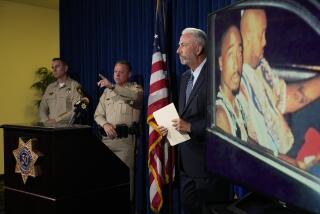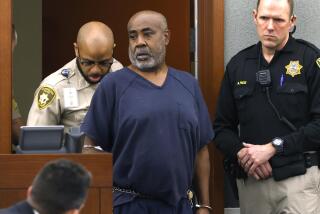Surprise Plea Ends Lurid Case
- Share via
Former Hollywood nightclub owner Eddie Nash pleaded guilty Monday to federal racketeering charges, abruptly ending his 20-year cat-and-mouse game with authorities who have long believed he played the lead role in one of Southern California’s more lurid murder mysteries.
Nash, now 72 and ailing, for years was suspected of ordering the bludgeoning deaths of four people at a Laurel Canyon drug den in 1981. The case, known as the “Wonderland murders,” came to symbolize the seamy side of the California lifestyle and even resulted in pornographic film star John Holmes facing murder charges before eventually being acquitted.
Nash’s guilty plea means he might be out of prison in less than two years. He faced a potential life term if convicted of all charges in a trial.
On Monday, Nash admitted paying a $50,000 bribe to the lone holdout on a 1991 state court jury that voted 11 to 1 to convict him of murder. After that mistrial, a second trial ended in Nash’s acquittal.
Nash also pleaded guilty Monday to one count each of money laundering and wire fraud during a hearing at U.S. District Court in Los Angeles.
Prosecutors said the plea agreement finally allows law enforcement authorities to close the books on Nash’s role in a murder case that has bedeviled them for years.
“What has been important to us and the law enforcement community in Los Angeles is that Mr. Nash stand up in court and admit his conduct,” said Assistant U.S. Atty. Daniel A. Saunders. “That is something he has never done before.”
Nash rose to his feet during what was supposed to be a routine court appearance and acknowledged that he had conspired to commit murder and that he had engaged in a long-running racketeering and drug-dealing enterprise.
Despite that acknowledgment, a defense lawyer then denied that Nash played any role in the quadruple slayings, which prosecutors said were carried out in retaliation for the armed robbery of as much as $1 million in drugs, jewelry and cash from his home.
“The record should be clear,” lawyer Donald M. Re told U.S. District Judge Carlos R. Moreno, “that the defendant is not admitting, and in fact denies, involvement in committing those murders.”
Outside the courtroom, prosecutor Saunders said the plea clearly spells out Nash’s complicity in the murder plot because he admitted sending several accomplices to retrieve the stolen goods, even if they had to use violence.
“He’s admitting to conspiring to kill them but not to actually going forward and participating in a scheme to murder anyone,” Saunders said. “I guess he’ll claim that the fact that they were murdered that night was a coincidence. I think the public can fill in the blanks.”
Nash was facing trial for his alleged role in the slayings, for racketeering and for possessing and selling cocaine and other drugs over a 17-year period.
The agreement requires Nash to serve 37 months in federal prison, including one year of time served since his arrest, and to pay a $250,000 fine.
One of his three defense lawyers said Monday that Nash is expected to spend about one year in federal prison when sentenced Nov. 19--less time than it would have taken for him to go to trial in the case.
“We want Eddie home so he can get medical attention,” Re said of his client. He said Nash agreed to the deal rather than fight the charges because he was suffering from emphysema, ulcers and a host of other ailments.
Nash, whose given name is Adel Nasrallah, was indicted by a federal grand jury in May 2000 on 16 criminal counts ranging from racketeering to wire fraud to money laundering.
Prosecutors said Nash and his associates--many of whom are identified as organized crime figures--trafficked in large amounts of heroin, cocaine and marijuana out of various Hollywood nightclubs Nash owned, including the Seven Seas, Starwood, Odyssey, Ali Baba’s and the Kit Kat Club.
In the course of carrying out their criminal enterprise, prosecutors said, they engaged in murder, violence, intimidation, bribery and money laundering.
Among the racketeering activities cited in the indictment were the July 1, 1981, murders of Ronald Launius, William Deverell, Barbara Richardson and Joy Audrey Miller on Wonderland Avenue in Laurel Canyon, just down the block from a house owned by then-Gov. Jerry Brown.
After Nash’s two state court trials, authorities kept investigating. During one search of his house, police found $1 million worth of cocaine. He served four years in state prison for narcotics possession.
Then in 1995, an organized crime figure in an unrelated case was caught on tape boasting to an undercover informant that he had helped bribe the holdout juror in the Wonderland murder trial, Saunders said. Prosecutors said Monday that the statute of limitations had passed and that the juror no longer could be prosecuted.
From there, authorities ratcheted up the investigation and began presenting evidence to the grand jury, culminating in Nash’s indictment. Long considered “the one who got away” by authorities, Nash was arrested May 19, 2000, at his Tarzana townhouse.
His arrest culminated a four-year investigation by the FBI, IRS, California attorney general’s office and the Los Angeles Police Department’s organized crime and vice division.
Retired LAPD Det. Tom Lange, who spent 20 years involved in the case as the original investigator, said he was frustrated that Nash faces only a total of 37 months.
But Lange said prosecutors were hampered by stale evidence, missing or dead witnesses and the fact that “there was never any evidence he was at the [murder] scene.”
“There were a lot of negatives for the prosecutors going into this,” Lange said. “So I believe it’s a righteous plea. How much more do they want to be perceived as beating up on an old man? So it works out well for all of them.”
More to Read
Sign up for Essential California
The most important California stories and recommendations in your inbox every morning.
You may occasionally receive promotional content from the Los Angeles Times.













